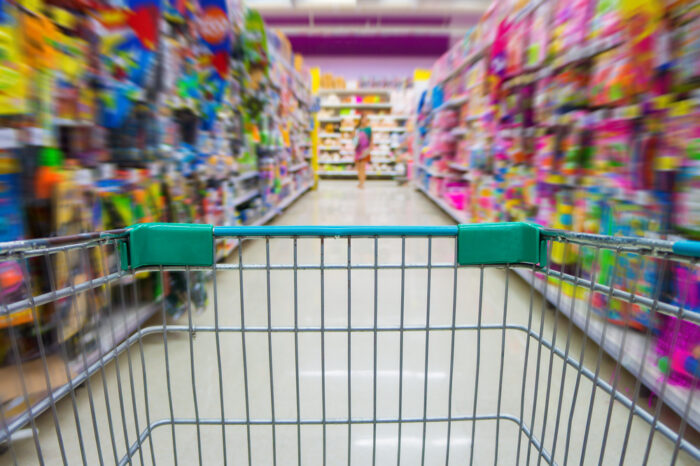Grocery price inflation has eased back to 5.3% – the lowest rate since March 2022 – despite fears the Red Sea shipping crisis might have made waves in market pricing.
The figure is down one-and-a-half percentage points in January, while take-home grocery sales grew in value by 5.1% in the four weeks to 18 February 2024.
According to data and analytics firm Kantar, shoppers increasingly turned to offers to keep their supermarket spends down. It reported a 4% increase in February, worth £586m more than the same month last year.
Indeed, own-label goods saw sales grow 5.5% versus branded products at 5.3%. And even those celebrating Valentine’s Day were on the hunt for offers, with £36m spent on meal deals costing £10 or more in the week leading up to the occasion, down from the £43m recorded last year.
However, sales of steak and boxed chocolate soared by 12% and 16% respectively when compared to the previous year.
Meanwhile, February also meant the end of ‘Dry January’ as Kantar revealed alcohol sales jumped 18% in volume terms versus the previous month. Shoppers bought 28% more wine and 16% more beer and lager. Red wine was also popular this year, with eight million more bottles bought in February compared to January.
‘Supermarkets pulling out all the stops’
Tom Steel, strategic insight director at Kantar, said: “Things are looking up for shoppers this February. Consumers have been navigating a grocery inflation rate of more than 4% for two years now, so this latest easing of price rises is especially welcome.
“Though there’s been lots of discussion about the impact the Red Sea shipping crisis might have on the cost of goods, supermarkets have been pulling out all the stops to keep prices down and help people manage their budgets.
“This month, Morrisons became the latest retailer to launch a price match scheme with Aldi and Lidl, after Asda made the move in January. More generally, we saw promotions accelerate this month after a post-Christmas slowdown. Sainsbury’s and Iceland’s efforts paid off in particular, and they were the only retailers to attract more shoppers through their doors.”
Supermarket market share
Lidl was the only retailer to achieve double-digit growth, with sales up by 10.9% over the 12 weeks to 18 February 2024, making it the fastest-growing grocer for the sixth month running. It now holds a 7.5% share of the market, an increase of 0.4 percentage points. Aldi also grew ahead of the market, boosting sales by 5.7% and maintaining its 9.4% share.
Sainsbury’s and Tesco increased their share of the market by 0.4 and 0.3 percentage points respectively. Sainsbury’s now holds a 15.6% share, with sales up 7.6%. Tesco’s sales grew by 6.2%, pushing Britain’s largest grocer to a 27.6% share of the market.
Waitrose increased sales by 3.8%, leading to a 4.6% share. Morrisons’ share now stands at 8.8%, as sales notched up 3.1% compared to last year.
Asda, which is on track to open its 1,000th, saw sales increase by 1.9%, taking its market share to 13.8%.
Frozen food specialist Iceland accounts for 2.3% of the market and grew sales by 2.1%, while Co-op’s sales were up 1.4%, resulting in a 5.3% share of the market.
Meanwhile, Ocado now holds 1.9% share of the total market as sales rose 4.9%, behind that of the total online market, which saw year-on-year (YOY) growth of 6.8%.
Related: Food prices finally fall as inflation rate remains at 4%





